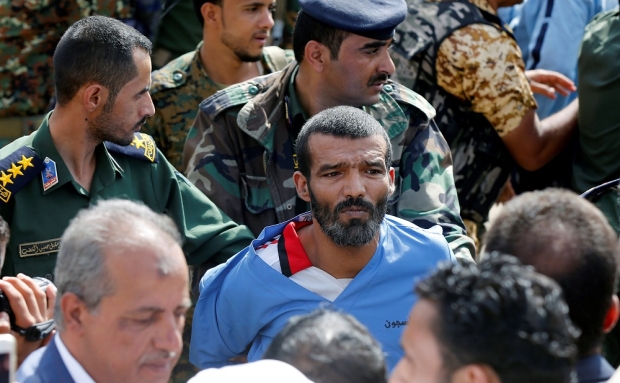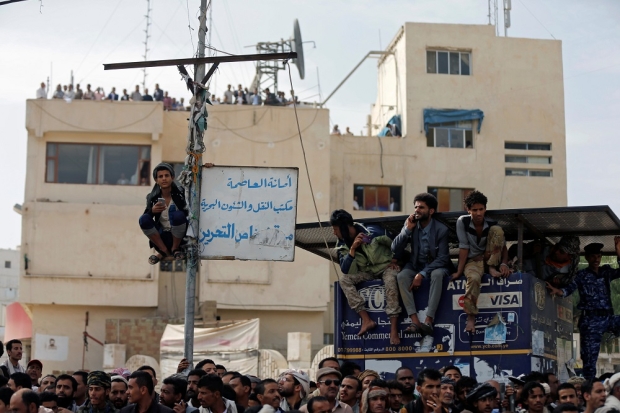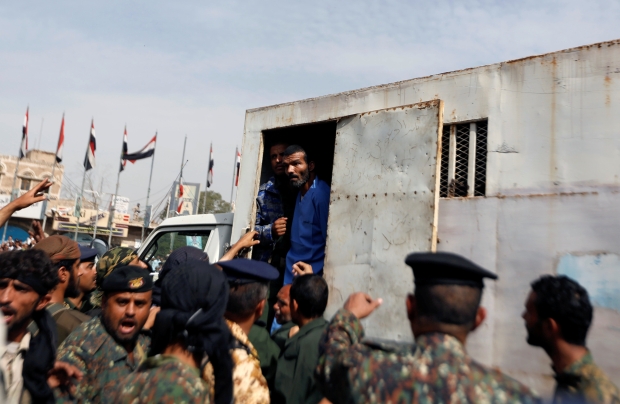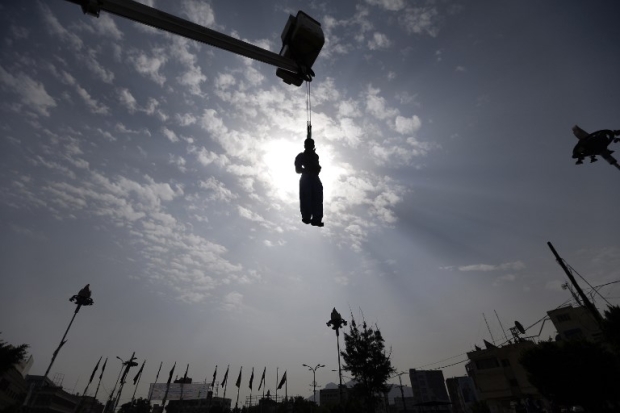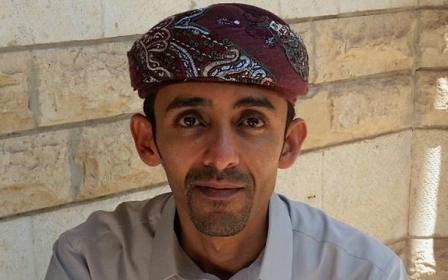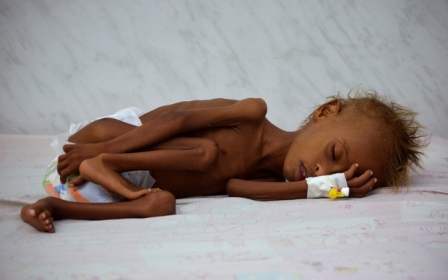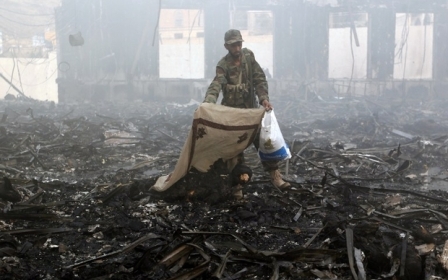Houthi justice: Yemenis flock in thousands to Sanaa public executions
SANAA, Yemen - The people had gathered in their thousands by the time Muhammad al-Maghribi, a man in his 40s, was led from a prison van by armed police, hands tied behind his back, and moved to a clearing in Sanaa's Tahrir square.
There, as police held back a surging crowd, Maghribi was led to a carpet, held face down, and shot several times in the back with an automatic rifle. His public execution was the first in what the Houthi movement says is a new crackdown on hardened criminals.
The second came a few days later. Hussein al-Saket, 22, was shot in the back in the same square and in the same manner, but this time his lifeless body was hoisted into the air by a crane and left to hang for all to see.
And while the vast majority at the executions backed the punishment of Maghribi and Saket - both were accused of raping and murdering children - the methods used and the potential for escalation could see a new wave of state-sponsored violence, targeting dissidents as well as criminals.
Maghribi's crime
It was late June, and the Eid al-Fitr festival was bringing some much-needed distraction from the war on Yemen. But for the family of three-year-old Rana, any joy was soon to be shattered, when her body was found in a nearby house.
She had been raped and murdered, and blame was soon directed at the owner of the house in which she was found.
Immediately, protests erupted outside of the house - in the Beit Meyad area of Sanaa - with locals demanding the arrest and execution of the owner.
Around the country, people began sharing a photograph of the alleged culprit, Maghribi, who had already fled south towards Dhamar province.
Two days later, residents there, with the help of security forces, tracked him down and arrested him.
Maghribi admitted his guilt, and he was then taken to appear in court in Sanaa.
Protesters soon surrounded the court building, again demanding that Maghribi face capital punishment.
This was a humanitarian issue and people from different sides welcomed it as there is seen to be nothing wrong with such executions
- Abdul Hamid Ahsan, protester
Abdul Hamid Ahsan, a pharmacist, was one of the hundreds of protesters who turned up that day, demanding Maghribi be executed.
"What happened to Rana al-Matari was bad enough, but the fact it happened during Eid, and that the criminal deprived her family from celebrating the festival, meant that the crime provoked a unique reaction from people," Ahsan told MEE.
While such court cases used to crawl through the judicial system - from the court of first instance, to the court of appeals and then the criminal court - Maghribi's trial was sped up, as the protesters threatened to surround the building were the trial to be delayed at all.
"One day the court of appeals tried to delay the trial to the next week," Ahsan added, "but we weren't going to allow that to happen and tried to storm the court, but then soldiers confirmed that the judges would announce their verdict the same day, which they did."
The trial was much faster than in normal cases, and the entire procedure, through three different courts, took one month in total.
After he was sentenced to death, Maghribi was whipped in a public square, and then shot dead by a soldier.
Crowds poured in from across the city to witness the first public execution during the reign of the Houthis.
Both supporters and opponents of the Houthi rebel group - in power in Sanaa - welcomed the execution, with many believing it will act as a deterrent for similar crimes in the future.
"This was a humanitarian issue and people from different sides welcomed it as there is seen to be nothing wrong with such executions. For me, I will keep protesting to demand the execution of criminals who harm children," Ahsan said.
Maghribi was well known in central Sanaa, and renowned for being mentally unstable, locals say. But any psychological issues were not taken into consideration by the courts.
In 2014, Maghribi was shown on Yemeni TV, opening a cultural centre in Sanaa, after the minister of culture declined the invitation - it was intended as a dig at the minister, replacing him with a local character.
Children's issues prioritised
Rana's father, Yahya al-Matari, believes that his daughter's case might have triggered a wave of support for public executions, and courts will now be encouraged to seek similar punishments.
"My child's case stirred the stagnant water, and I think we will now see more of the same such punishments, in the cases of crimes against children," he told MEE.
A week after Maghribi was executed, the courts in Sanaa sentenced a child rapist to 25 years in prison.
And then another child-killer, Hussein al-Saket, 22, was executed and hung from a crane in the same square that Maghribi was executed in.
He had been found guilty of kidnapping, raping and murdering a five-year-old child two years ago.
Matari is grateful to those Yemenis who campaigned for his child's killer to be executed, and who ensured his trial was sped up, turning it into a matter of public debate.
He now feels crimes affecting children have become a priority for the courts.
He did not bury Rana until after her killer was in the ground.
"It is difficult to bury the dead body of my child while her killer is still alive. Retribution is the law of Allah and I hope to see more criminals meet their punishments."
A judge in the court in Sanaa told MEE that after the protests last month, any crimes in which children have been victims have now been prioritised, and all outstanding cases are being addressed as soon as possible.
He spoke to MEE on condition of anonymity, as he is not authorised to speak to the media.
It is difficult to bury the dead body of my child while her killer is still alive. Retribution is the law of Allah
- Yahya al-Matari, victim's father
"During the last month, the courts in Sanaa have issued three judgments on crimes involving children, including two which were punished with execution.
"The courts have not executed any convicted criminals over the last two years, but we have now started to do that, since last month. And we will conduct fair trials," the source said.
Despite the courts facing criticism to the contrary, he stated that they were working independently and that the protests outside the courts were influential in encouraging the judges, catalysts for capital punishment being handed down.
The source confirmed: "The judges decide the kind of punishment and the methods according to the crime, so no one can decide the kind of punishment that the criminal deserves but the judges."
The death penalty is deemed cruel, inhuman and degrading by human rights groups.
Sarah Leah Whitson, Middle East director at Human Rights Watch, told MEE that while the rights group had not yet been able to examine the cases in detail, it was opposed to the death penalty in any instance.
"As you can imagine, we oppose the death penalty in all circumstances and would be particularly wary of any death penalty sentence in a context such as Yemen, where it is difficult to obtain a fair trial even in peacetime."
Amnesty also opposes the death penalty at all times, regardless of who is accused, the crime, guilt or innocence or method of execution.
Lack of trust in courts
Nabil Fadhel, head of the Yemen Organisation for Combating Human Trafficking, said his NGO has monitored many crimes against children, and that often families of victims are ashamed to go public with the cases due to societal views on rape, often allowing victims to escape justice.
"The main reason that Rana al-Matari's killer's trial was so fast was due to the campaign on social media and the protest outside of the courts - we are not used to seeing trials finishing up within one month," Fadhel said to MEE.
"Moreover, the relatives of victims usually avoid complaining to police because police often do not arrest criminals, and if they do the courts delay the issue so long that trials take years to start, so people often prefer to bury their children without complaining."
Also, he said, societal perceptions lead the rape of children to be a seen as a source of shame for the victim's family, so many families prefer to keep it secret.
We fear that the Houthis have started with the execution of criminals, and they will then move on to executing their opponents
- Anonymous, social activist
Fadhel added: "The organisation tried to follow some cases of rape and killing but the trials were delayed for such a long time that the relatives of victims gave up any hope of seeing the perpetrators being punished."
Amid the praise for the public executions among much of the Yemeni public, there have also been fears that the extreme punishment will soon be meted out against political opponents.
Speaking on condition of anonymity, a social activist in Sanaa told MEE that there is growing disappointment in the Houthis as the humanitarian situation lurches from bad to worse. He believes the Houthis are trying to send a message that they are still strong and in control, by ruling with an iron fist.
"This period is sensitive and people are starting to lose trust in the Houthis, as crime levels are increasing and public employees have gone without salaries for over 10 months," he said.
"We fear that the Houthis have started with the execution of criminals, and they will then move on to executing their opponents."
This article is available in French on Middle East Eye French edition.
New MEE newsletter: Jerusalem Dispatch
Sign up to get the latest insights and analysis on Israel-Palestine, alongside Turkey Unpacked and other MEE newsletters
Middle East Eye delivers independent and unrivalled coverage and analysis of the Middle East, North Africa and beyond. To learn more about republishing this content and the associated fees, please fill out this form. More about MEE can be found here.


